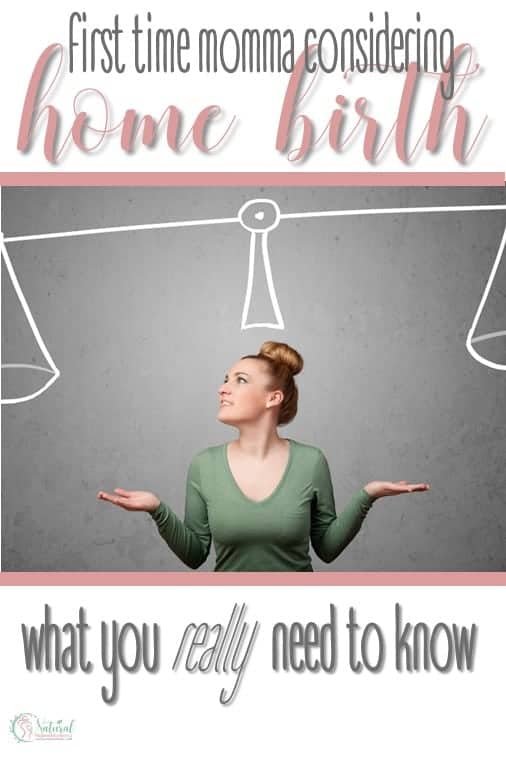
Home birthing has had an upward trend over the past few years. As it becomes more popular, more questions surface from mamas who are interested in having a home birth. Today I’m going over whether or not you can have a have a home birth with your first child.
In short, the answer is yes, considering you are having a normal and low-risk pregnancy.
There are also other factors to consider such as whether or not you have diabetes or high blood pressure as this would make it unsafe to deliver your baby at home.
Why more woman are going natural
Four of the most common reasons for choosing a home birth are:
- There is little or no medical intervention. This includes an epidural, induction of labor, monitoring equipment (in some cases) and so on.
- You have a desire to give birth in a familiar place. This adds comfort and therefore reduces some of the stresses and fears of childbirth.
- You have freedom. In your home, you are comfortable. Free to get up and walk when you want, take a soothing bath to relax your body, eat, lie on the floor. You can pretty much do whatever you want to do with no machines restricting your movement, or IV’s sticking in your arms or hands (OR YOUR BACK). It’s understandable why this would sound appealing to any mother!
- You don’t have to pack a bag or prepare for a hospital stay. Clothes and cell phone chargers can stay where they lay. Everything you need is right at your fingertips.
Benefits and risks associated with home births
As with anything, there are benefits and risks and it’s important to educate yourself on them before coming to a decision.
Benefits and advantages:
- Babies born at home require less resuscitation than those born in hospitals. (source) This means fewer babies have to be brought back to life which is obviously a great benefit.
- Less risk of infection. The infection rate doubles in a hospital environment when compared to that of a home environment. (source) Hospitals are not the cleanest places in the world. Think about it, there are sick people in and out of a hospital all day long and normal humans like me and you cleaning the rooms. At home, there is usually only a select few people in and out of your house which reduces the risk of infection.
- Natural is best. Our bodies were designed to endure childbirth. It is a natural process that goes smoother when you let nature take its course rather than taking a bunch of different medicines and being confined to a bed.
- Being in the comfort of your home reduces fear and stress and in turn, relaxes your body and makes it easier to give birth compared to being in a hospital environment.
- You are at a reduced risk of perineal tears than if you have your baby in a hospital. Women who have their baby in a hospital are at 5 times higher risk of having a perineal tear than women who have planned home births. (source)
- You don’t have to stay in a hospital all alone for 1 or in some case 2 or 3 nights. This is a great benefit. You don’t have to worry about being in an uncomfortable place surrounded by strangers. Your family and/or midwife is taking care of your child rather than him being in a nursery potentially exposed to germs and illnesses.
- You can eat whatever and whenever you please. In a hospital setting, you often have to go more than 24 hours without food, depending on how long labor, delivery, and recovery takes. I don’t know about you but that is entirely too long for my body to go without food. The reason you can’t eat is that all of the pain medicine mixed with food would make you sick. At home, you don’t have to worry about this because you aren’t taking any powerful pain meds.
Some risks include:
- Increased risk of having to be transported to the hospital. If it’s your first pregnancy, there is a 25 to 30 percent chance that you will end up going to the hospital. Reasons for this could be no progress in labor, fetal distress, the need for pain medication, or bleeding along with other things.
- Increased risk of neonatal seizures which are abnormal electrical discharges in the CNS (central nervous system.) The chances of it happening are still extremely low, not even 1 in every 1,000. (Source)
- Increased risk of perinatal mortality (which is fetal death.) Approximately 4 in every 1,000, which is still very low. These deaths are most often caused by delivery problems. According to ACOG.org, 39% of infant deaths were from labor and delivery complications, 30% were caused by birth defects, and 16% were caused by infection.
- Significant blood loss. In the event that you began to hemorrhage, you would then be transported to a hospital for further emergency treatment. It is a risk whether in a hospital or at home, but a hospital is better equipped for that situation than a midwife.
Is home birthing right for me?
There are many factors that determine whether or not home birthing is ideal for you.
Having a home birth in your first pregnancy is considered safe if you,
- are pregnant with only one child.
- have a low-risk pregnancy, which means it is free of pregnancy-induced and non pregancy induced illnesses or diseases.
- want to have a natural birth, free of interference and restrictions.
You are NOT recommended to have a home birth if you have,
- type 1 diabetes or gestational diabetes (in some cases). Women with type 1 diabetes or gestational diabetes tend to have larger babies and also, in turn, tend to be at a higher risk of having to have a c-section. This increases the risk of complications arising during delivery.
- high blood pressure. When you have high blood pressure during pregnancy, you are more likely to experience delivery complications. Complications can include preterm delivery, placental abruption, and the need for a c-section.
- a baby that isn’t in the head-first position. Babies who are breech (feet first) are at a higher risk of death/injury than a baby in the head-first position. For this reason, you will need more monitoring and possibly a C-section in some cases.
- multiple babies. When you are having any more than one child, the safest thing to do is to give birth in a hospital environment where you are heavily monitored.
- have had a c-section in the past. This increases the risk of uterine rupture which is when the scar from your previous c-section opens back up while trying to give birth vaginally. There is a very low risk of this happening. (1 in 100 according to whattoexpect.com.)
Preparing for your first home birth
What you need:
- A midwife– It is crucial to have an experienced midwife to assist you and prepare you for this exciting time. During the birth, she will have all the necessary equipment in case complications arise. Some of the equipment she may have is monitoring equipment like stethoscopes and thermometers, birthing equipment (sterilized), and also a blood pressure cuff.
- A plan- You should have an idea of how this thing is going to go. You should at least know where you want to have your child, who will be there, and what items you will need for the baby once he/she is welcomed into the world such as diapers, wipes, blankets, towels, formula, (if not breastfeeding), etc.
- Research and watch Youtube videos to help you learn more and make sure you are making an informed decision. Youtube is a great resource for learning all types of things and you could find it extremely useful.
Important factors to consider
- If applicable, is your partner accepting of the idea? It is best that both parties are all for home birthing before making this decision. If you do it against your partner’s will, it could create a stressful and anxious atmosphere and that could cause complications with your home birth.
- Are all of your questions answered? If not, do a little more digging to find out exactly what you need to know. Satisfy any curiosity you may have so you are completely comfortable with the idea.
- Are you prepared? Have you thought about every aspect? There will be no traditional labor pain medication. It will be painful but oh so worth it in the end. In fact, mothers who have had hospital births in the past and later, had a home birth reported that it was less painful than their hospital birth.
- Remember, calmness equals LESS pain. The more calm and relaxed you are during the birthing process, the less pain you will feel because you won’t be fighting against your body during this natural action. That is why there is less pain in home births, the body is more relaxed and at ease, because you are in your comfort zone.
Now that we know all the risks and benefits, you should have a good idea whether or not you and your baby are compatible with home birth. No matter what you choose, do what you feel is the best option for YOU. The next steps are finding a midwife, coming up with a birthing plan, and getting your partner/family on board. Good luck!
Know any other gonna be first time moms? Share this article with them so they can be empowered and informed of all of their options, not just the conventional hospital route.


